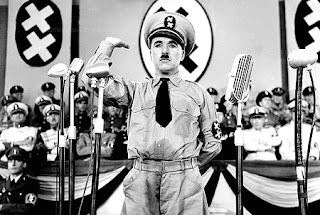Genre: Drama
Directed: Abderrahmane Sissako
Stars: Ibrahim Ahmed, Abel Jafri, Toulou Kiki, Layla Walet Mohamed, Mehdi A.G. Mohamed, Hichem Yacoubi, Kettly Noel, Fatoumata Diawara, Adel Mahmoud Cherif, Salem Dendou
Production: Cohen Media Group
Timbuktu won the Francois Chalais Award at Cannes in 2014 and was nominated for Best Foreign language film at the 2015 Academy Awards. It's easy to see why. Not only is it a beautiful, serene and well-made film but it also has the fortitude to take on radical Islam in a brash, yet compassionate way. The fact that this film and director Abderrahmane Sissako has been readily accepted by the western world is not only evidence that audiences are willing to see films depicting extremism, but are willing to accept a more nuanced version than the caricatures we've conjured in out own minds.
 |
| Caricatures like this... |
There are many side stories that decorate the edges of Timbuktu's moral parable. While these stories don't necessarily provide interesting characters they do provide some arresting images. An audacious woman known by the locals as La Chanteuse (Diawara) constantly employs subtle forms of silent protest against the city's occupiers. The simplicity of her protests provide the film with some iconic images. In one scene another woman is given twenty lashes for singing and being in a room with a non-relative man. As she sobs with every stroke of the whip, she begins to sing in a singular act of defiance. Another almost absurd aside includes a group of school children playing soccer without a ball since the sport itself is forbidden.
The Jihadists themselves are portrayed as foolish hypocrites; sneaking smoldering puffs of cigarettes smoke and conversing about their favorite soccer teams when no one is watching. When two of them try to enter a mosque with weapons, the local Imam (Cherif) curbs their excesses with sermons on humility, leniency, respect and kindness. Their reactions are often ones of puzzlement, unable to keep up with the Imam's learned discourse.
Yet it's moments like these that provide the film's biggest trouble spots. In an interview with Al Jazeera, Sissako explained that he's trying "to speak on behalf of people who are frustrated with this image...this constant degrading image of Islam." To that end Timbuktu is less of the humanist work like his previous Waiting for Happiness (2002) and more like a classroom lecture. Many have latched on to the film's zeitgeist and made comparisons to The Great Dictator (1940). One could no doubt take Chaplin's closing monologue and feel the same sense of erudite pretension. Yet by coming out and saying what the film's about, it stunts the film's natural humanity. We reach points of tragedy, not with a sense of loss but with a narrative coda. One that resembles and argumentative rebuke.
 |
| Gee, I wonder what this movie is going to be about... |

Abderrahane Sissako is certainly one of the most talented Cineastes coming out of Africa today. His visual grammar is on par with international contemporaries and his panache for emotional complexity makes him a torchbearer for Cinema's most renowned humanists such as Satyajit Ray, Masaki Kobayashi and Charles Burnett. Thus, Timbuktu ultimately feels like a compromise. The director's desire to connect with a larger (presumably) western audience seems to supersede the film's fertile narrative which is unfortunate. Yet by the merit of the film's imagery and some very potent religious themes, there is forgiveness, there is leniency.

Final Grade: C+



No comments:
Post a Comment